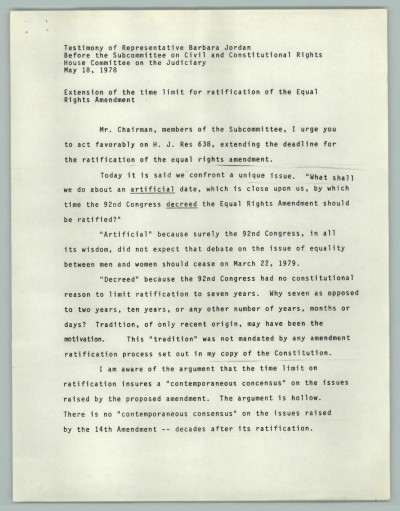In 1978, proponents of equal rights for women were beginning to feel a little trapped. When the 27th amendment passed the Senate and House of Representatives in 1972, Congress placed a seven-year deadline on the ratification process–1979. In the first year, 22 of the required 38 states (including Texas) ratified the amendment. Hope dwindled, however, as opponents organized and ratification slowed.

Jordan, Barbara, 1936-1996. Extension of the time limit for ratification of the Equal Rights Amendment, Text, May 18, 1978; (http://texashistory.unt.edu/ark:/67531/metapth595266/ : accessed August 11, 2015), University of North Texas Libraries, The Portal to Texas History, http://texashistory.unt.edu; crediting Texas Southern University, Houston, Texas.
Even though Texas was one of the first states to support women’s rights by ratifying the 27th amendment, Texas women still had their futures to worry about. If the amendment didn’t pass, it meant that a good part of the country was against them and their desires for equality. This news segment from UNT’s KXAS-NBC 5 collection shows women advocating for Congress to push back the ratification deadline. They hoped this would give them a bigger chance of winning the required 38 states. Barbara Jordan, an African-American Texas woman serving in the U.S. House of Representatives, gave a testimony on the matter of extending the ratification deadline. The first page of that testimony is pictured. To view the entire document on The Portal to Texas History, click here.
Following testimonies and after careful consideration, Congress agreed to push the ratification deadline back until June 30, 1982. Despite this extension, the country was three states short of ratifying the Equal Rights Amendment.
While Texas women struggled at the national level for equal rights, they made great strides at home in the Lone Star State. In 1972, the Texas Equal Rights Amendment and the Equal Employment Opportunity Act were enacted. Laws banning discrimination against women were introduced and passed in quick succession, including a law that forbid men from deserting and selling homesteads without their wife’s consent.
The KXAS/NBC-5 collection is perhaps the largest collection of local news in the country. With scripts, video footage, and log books from 1951 onward, the collection showcases the evolution of the southwest metroplex. Currently, a selection of news scripts and video footage from the 1950’s, 70’s, 80’s, and 90’s is available for viewing on The Portal to Texas History.
-by Alexandra Traxinger Schütz



Leave a Reply